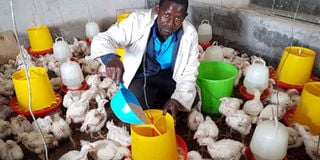Indepth insight on Newcastle disease

A poultry expert feeds chicken at a poultry resource centre in Gilgil. Biosecurity measures like disinfecting cars entering and leaving your farm, foot dips at the entrance into the poultry house and clean clothing for employees goes a long way in preventing transmission of diseases such as Newcastle. FILE PHOTO | NMG
What you need to know:
- The most affected are the domestic fowls, turkeys, pigeons and parrots. The rest of the birds have milder symptoms of the disease.
- Once infected, the birds will take 5-6 days then start showing signs of disease.
- The disease has no cure but can be prevented.
- Biosecurity measures like disinfecting cars entering and leaving your farm, foot dips at the entrance into the poultry house and clean clothing (dustcoats and gumboots) for employees goes a long way in preventing transmission of diseases.
Often referred to as Avian Distemper, Newcastle disease is one of the most serious poultry diseases. It is a highly contagious viral disease affecting both domesticated and wild birds.
The most affected are the domestic fowls, turkeys, pigeons and parrots. The rest of the birds have milder symptoms of the disease.
Newcastle disease is associated with a high mortality rate of up to 100%. Newcastle is spread from one bird to the other through:
• Direct contact with secretions like faeces and mucus of infected birds. Common in caged birds.
• Contaminated feed and water
• Contaminated poultry houses (by previous birds)
• Poorly disposed carcasses
• Human clothing and equipments contaminated by an infected flock
Once infected, the birds will take 5-6 days then start showing signs of disease. Young birds are the most affected. Clinical signs of Newcastle disease include:
• Respiratory signs: nasal discharge, coughing, sneezing, snoring and gasping for air
• Twisted neck and head
• Drooping of wings and dragging of legs and in severe cases complete paralysis
• Drop and eventually stop laying eggs
• Laying of misshapen eggs with an abnormal colour, rough shells or thin shells that contain watery albumen
• Greenish watery diarrhoea that matt the vent feathers
• Swelling of the tissues around the eyes and neck
Newcastle virus has a number of strains that vary in their severity of clinical signs. It may range from in apparent infection to a rapidly fatal condition.
The disease has no cure but can be prevented. How then can we prevent Newcastle disease from infecting our birds?
There are vaccines available in the market that can prevent infection of Newcastle virus. The vaccines can be administered through drinking water or a drop into their eyes or nostrils.
PREVENTION OF THE DISEASE
Healthy chicks should be vaccinated from the second or third week of their lives to avoid interference of maternal antibodies with an active immune response.
Never vaccinate sick birds, vaccines are not meant for treatment but for prevention. There are several causes of vaccine failure:
• Improper handling of vaccine either at the Agrovet level or farm level will affect its efficacy. Vaccines should be stored between a temperature range of 2°C and 8°C.
• Vaccine mixed in chlorinated water; chlorine will kill the live vaccine and make it ineffective. Boil water to eliminate the effects of chlorine.
• If using well or ground water, minerals and other impurities found on “pure” ground water will bind to the vaccine live organisms, preventing them from reaching the desired tissues inside the bird.
• If the birds were under any antibiotic treatment, withdrawal period must be observed before vaccination. Antibiotics will kill the live vaccine.
While vaccinating the chickens provide the birds with Stressmix as vaccination is a stressful and does affect their performance.
Practice proper disposal of dead birds and slaughter of infected/sick birds as soon as possible. This goes hand in hand with management of manure and litter.
Practice an all in, all out stocking policy. Wait for at least 21 days to restock after culling the birds. Disinfect the premises after all the birds have been culled.
Biosecurity measures like disinfecting cars entering and leaving your farm, foot dips at the entrance into the poultry house and clean clothing (dustcoats and gumboots) for employees goes a long way in preventing transmission of diseases.
Avoid keeping pet birds in the same facility as your chickens as they may be carries of diseases that will be transmitted to the fowls.
Keep visitors away from your poultry house and avoid visiting other poultry houses to prevent transmission of diseases.
Do not vaccinate your chickens if there is an outbreak of Newcastle disease in your neighbourhood.
****
Dr John Muchibi is a Veterinary Surgeon and the Animal Health Manager at Elgon Kenya Ltd. Reach him through 0733715102 or e-mail him through [email protected]




